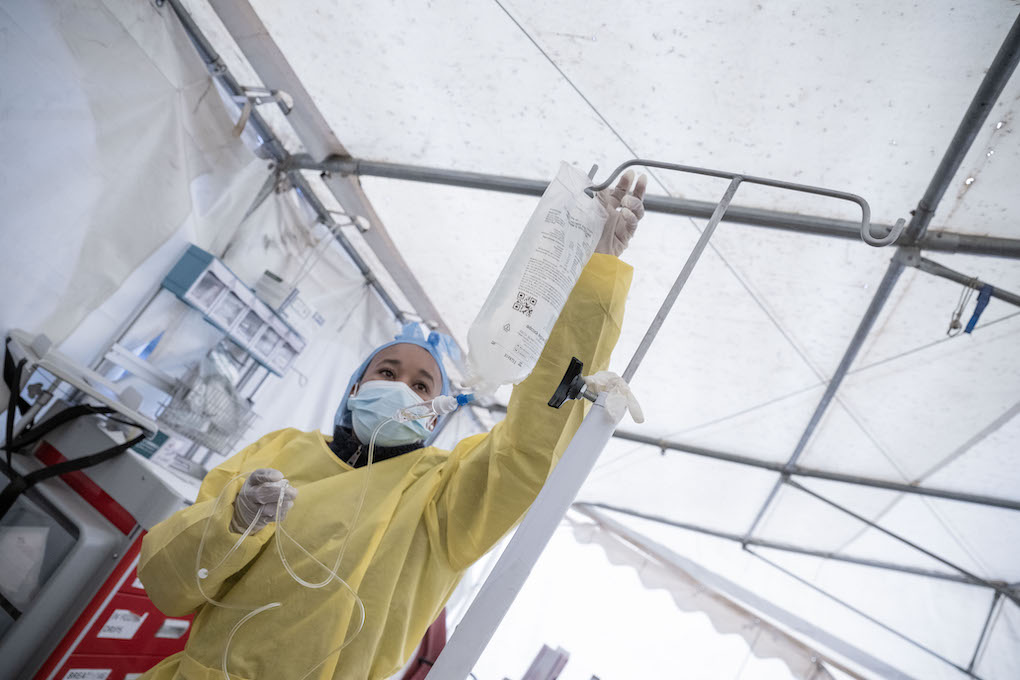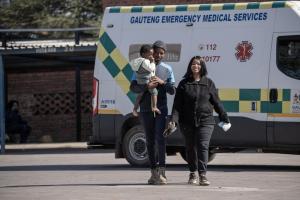Rapid response ends cholera outbreak
Pretoria ‒ Hammanskraal resident Tebogo Hlongwane was terrified when she took her three-year-old son, Agisang, to the emergency room at Jubilee District Hospital. “It was scary because I thought he was going to die,” she recalls. Agisang, who presented with acute diarrhoea, vomiting, and lethargy, was admitted into a special ward and treated for cholera. Five days later, he was released.
Although 1290 suspect cholera cases (199 confirmed cases) and 47 deaths (20 among confirmed cases) have been reported nationally since 1 February 2023, the response by South Africa’s Health Department, supported by World Health Organization (WHO) and other partners, speedily controlled the outbreak.
“The field hospital relieved us of the pressure of an influx into the hospital.” Engelina Masemene, nurse, Jubilee District Hospital
Three days after the first case was detected in Hammanskraal, a town in the northern Gauteng province, on 19 May 2023, the response team erected a cholera triage centre within the premises of Jubilee Hospital. A few days later a field hospital was established in Kanana, the epicentre of the outbreak, in just six hours. That same night, health workers attended to their first patient.
“Because the field hospital was set up close to the community, patients who needed to be referred were already on a drip by the time they were admitted here,” says Engelina Masemene, an emergency room nurse at nearby Jubilee Hospital. “The field hospital relieved us of the pressure of an influx into the hospital.”
Outbreak response teams were immediately dispatched to any community in which a suspected case was reported. While verifying their status, team members used the opportunity to collect samples, identify possible cases nearby, and conduct health promotion on the use of safe water and food and hand hygiene to community members. Cholera information materials and hygiene kits were distributed to all households within a 100 to 250 metre radius of a household with a cholera case.
“WHO was here on the ground, together with the Department of Health, to help raise awareness of this terrible disease, which took so many lives.” Adam Mashaba, Ward Councillor, Kanana
“Our cases started decreasing because of this intensified active case finding in communities, and the social mobilization and awareness that we were creating,” says Refilwe Mokgetle, Director of Public Health in the Gauteng provincial health department.
Masemene concurs that health education was a key element in the rapid containment of the outbreak. At the peak of the outbreak in the last week of May 2023, the reported number of cases stood at 392 per week, but just a month later, on 21 June, these were down to six cases per week.
“We educated every single person who came into the hospital about handwashing and how to ensure their food and water wasn’t contaminated. That way you treat not only one patient, but also educate an entire family,” she says.
WHO deployed a team of experts to train national specialists in South Africa’s nine provinces in every aspect of the response. Under WHO’s incident management system, the team supported key pillars of the response, including surveillance, case management, infection prevention and control, water, sanitation and hygiene, and risk communication and community engagement.

The Organization also conducted readiness assessments in key health facilities to identify areas that needed urgent attention to ensure strengthened capacity for cholera case management, as well as training of health workers in infection prevention.
“WHO was here on the ground, together with the Department of Health, to help raise awareness of this terrible disease, which took so many lives,” says Adam Mashaba, Kanana’s ward councillor.
In the aftermath of the outbreak, WHO is supporting the government to conduct cholera readiness and preparedness workshops in all nine provinces, to ensure continued vigilance.
Hlongwane is relieved that Agisang has made a full recovery, after keeping an eagle eye on him once he returned home from hospital. “He was still a little weak for two days. But then he started to get better, and I was so happy,” she laughs.
WHO South Africa
Email: musinahamat [at] who.int (musinahamat[at]who[dot]int)
Tel: +27647569742
Media Relations Officer
WHO Regional Office for Africa
Email: dalalm [at] who.int (dalalm[at]who[dot]int)
Tel: +254 703 245 761 (WhatsApp)
